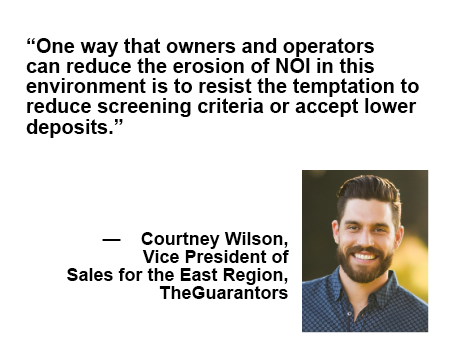Multifamily operators face a number of challenging factors in today’s market. The spike in the cost of debt along with higher expenses across the board — from property insurance and taxes to construction and labor — as well as adverse effects left over from eviction moratoriums are eating away at net operating income (NOI) across the country. During the third quarter of 2023, multifamily expenses grew 7.2 percent, more than double the rate of inflation, according to Freddie Mac’s 2024 multifamily forecast.
Additionally, rent control efforts in some jurisdictions are restricting rent increases, thereby removing an effective landlord tool to offset rising expenses or damages, notes Courtney Wilson, vice president of sales for the East region with TheGuarantors. The New York-based financial technology company serves the multifamily industry by providing lease guarantees, security deposit replacements and renters insurance and compliance solutions. They shield operators against financial risks and foster a more inclusive renting environment.
“Achieving and maintaining healthy operating margins in the multifamily space tends to be a challenge even under ideal market conditions,” he states. “But many of the operators we work with are being impacted by all of these factors to some degree.”
Supply Pressures
New supply is compounding the difficulties. Developers delivered 565,000 new units in 2023, the highest buildup since the mid-1980s, according to CoStar. That has helped push up the average vacancy rate in the nation to 7.6 percent, which is nearly 300 basis points higher than it was in 2021, the organization reports. As a result, rental rate growth has flattened.
Some 950,000 units are currently under construction, and deliveries this year are expected to hit a still-elevated 450,000 units. Sunbelt markets have experienced the most construction, with many seeing double-digit vacancy rates, Co-Star notes. Meanwhile, three-star mid-priced multifamily assets have better rent-growth prospects this year than four and five-star luxury properties, it adds.
Amid these pressures, some operators are reducing deposits to as low as $300 and have introduced more flexible screening standards to remain competitive — exposing themselves to potentially greater losses associated with rent default, damage and fraud, Wilson observes. Still others have decided to sell versus attempting to build to the scale needed to generate a decent return.
“Tight margins continue to challenge the multifamily industry, which is fueling a consolidation among fee managers,” he says. “And depending on the amount of leverage they have, owners who can’t afford to continue to operate are offloading assets to more established players.”
Resisting Temptation
While Wilson anticipates interest rates retreating this year, which will help alleviate some of the pain, it is likely that the increases in operating and construction costs are here to stay. “One way that owners and operators can reduce the erosion of NOI in this environment is to resist the temptation to reduce screening criteria or accept lower deposits,” Wilson explains.
He also recommends that operators implement solutions to foil the growing frequency of fraud. Often renter fraud is committed by applicants who are using stolen or bogus identities, paycheck stubs or other documents. According to a recent NMHC Pulse Survey, 71 percent of owners and operators saw increased fraud over the preceding twelve months when surveyed.
“A phrase I hear a lot is that a good head in a bed is very different from a bad head in a bed,” Wilson remarks. “A watered-down screening process and a low deposit may work in all the good cases, but they never work in any of the bad cases.”
Leverage Insurance
Owners and operators who take advantage of smart insurance solutions can also help to boost occupancy and protect NOI. TheGuarantors offers products that can help operators convert more applicants — including conditionally approved and denied applicants — while securing rent roll and strengthening the bottom line. This approach is an effective way to avoid bad debt by improving cash flow and streamlining operations, all at no cost to owners and operators.
In addition to lease guarantees and security deposit replacements, products also include renters insurance and compliance, which provides always-on digital monitoring and a master policy to close the gap on renter-caused accident liability costs. The company also serves as an additional safety net for fraud, ensuring recovery from losses due to rent defaults, lease breaks, unpaid utilities, vacancies, damages and more. In each case, the renter pays for the coverage.
Property managers currently accepting low deposits in a “race to the bottom to stay competitive,” for example, risk significant losses in instances of severe damage or rent defaults, Wilson warns. That’s particularly true if they have to litigate to repossess units in markets that have passed laws to make the eviction process more difficult and time-consuming. Plus, paying third parties to collect outstanding rent or reimbursement for repairs rarely, if ever, makes operators whole, he adds.
“Using insurance to cover the income on a lease instead of depending on a cash deposit is a huge benefit to NOI,” Wilson points out. “In some cases, we’re insuring 12 times the monthly rent in a lease guarantee, which is an attractive alternative to hiring a collection agency and ultimately writing off the amount of debt you do not recover.”
— By Joe Gose. This article was written in conjunction with TheGuarantors, a content partner of Multifamily & Affordable Housing Business.
Learn more about TheGuarantors here.
For more information on becoming a Multifamily & Affordable Housing Business content partner, contact Jill Dickstein.


